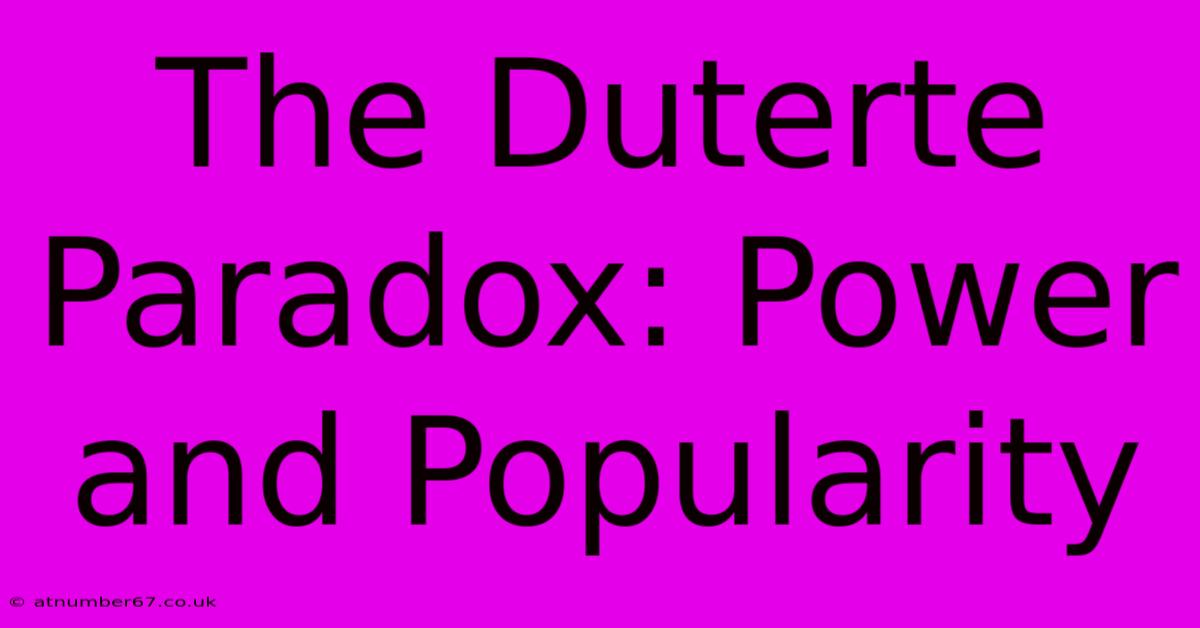The Duterte Paradox: Power And Popularity

Table of Contents
The Duterte Paradox: Power and Popularity
Rodrigo Duterte's presidency in the Philippines presented a compelling paradox: immense popularity alongside highly controversial policies. This article delves into the complexities of his leadership, exploring the factors contributing to his widespread support and the criticisms that shadowed his administration. Understanding this paradox is crucial to grasping the nuances of Philippine politics and its evolving social landscape.
The Rise of a Populist Leader
Duterte's ascent to power was fueled by a potent blend of populist rhetoric and a promise of decisive action against crime. His "war on drugs," characterized by a brutal crackdown on drug users and dealers, resonated with a significant portion of the population weary of escalating crime rates and perceived government inefficiency.
Key Factors Contributing to Duterte's Popularity:
- Strongman Persona: Duterte cultivated an image of a strong, decisive leader unafraid to challenge established norms and institutions. This resonated with a population yearning for decisive action and a departure from the perceived corruption and ineffectiveness of previous administrations.
- Anti-Establishment Sentiment: His campaign effectively tapped into deep-seated anti-establishment sentiment, portraying himself as an outsider fighting against the corrupt elite. This resonated with many Filipinos who felt marginalized and disenfranchised.
- Effective Communication: Duterte's plain-spoken style, often employing colorful language and direct communication, resonated with a large segment of the population who found his authenticity refreshing. This contrasted sharply with the more formal and polished communication styles of his predecessors.
- Focus on Infrastructure: The "Build, Build, Build" infrastructure program, while controversial in its implementation and funding, did deliver visible improvements in infrastructure across the country, bolstering public support for his administration.
The Shadow of Controversy: Human Rights and Authoritarianism
Despite his popularity, Duterte's presidency was plagued by accusations of human rights abuses, particularly in relation to his war on drugs. The high death toll and alleged extrajudicial killings sparked international condemnation and domestic criticism.
Criticisms of the Duterte Administration:
- Human Rights Violations: The sheer number of killings associated with the war on drugs overshadowed any perceived successes in crime reduction, fueling widespread concerns about human rights violations and due process. International organizations and human rights groups consistently criticized the administration's approach.
- Authoritarian Tendencies: Critics pointed to a weakening of democratic institutions and a rise in authoritarian tendencies, including attacks on press freedom and the suppression of dissent. These actions raised concerns about the long-term implications for Philippine democracy.
- Escalation of Violence: The "war on drugs" not only led to a significant increase in killings but also fostered a climate of fear and impunity, impacting communities across the country. This violence extended beyond drug-related crimes, contributing to a general sense of insecurity.
- Economic Inequality: While infrastructure projects provided visible improvements, the benefits were not evenly distributed, leaving many Filipinos still grappling with poverty and economic inequality. This disparity fueled criticism of the administration's economic policies.
The Enduring Legacy: A Complex Narrative
Duterte's legacy remains a complex and contested issue. While his supporters credit him with restoring order and initiating infrastructure development, critics highlight the severe human rights costs and the erosion of democratic principles. The Duterte Paradox highlights the multifaceted nature of populist leadership and the challenges of balancing popular support with the upholding of fundamental rights and democratic processes. Further research and analysis are crucial to fully understand the long-term consequences of his presidency on Philippine society. The impact on Filipino politics and the nation's international standing will continue to be debated for years to come. His presidency serves as a case study in the interplay between popular appeal, strongman leadership, and the erosion of democratic norms. Understanding this paradox is crucial for navigating the future of Philippine politics.

Thank you for visiting our website wich cover about The Duterte Paradox: Power And Popularity. We hope the information provided has been useful to you. Feel free to contact us if you have any questions or need further assistance. See you next time and dont miss to bookmark.
Featured Posts
-
Kikwete Age Analyzing Its Successes
Apr 04, 2025
-
Jurnee Smolletts Net Worth Beyond The Acting Career
Apr 04, 2025
-
Alex Pereiras Net Worth The Complete Guide
Apr 04, 2025
-
Haris Raufs Son Keeping It Real
Apr 04, 2025
-
The Secrets To Stuart Pearces Financial Success
Apr 04, 2025
